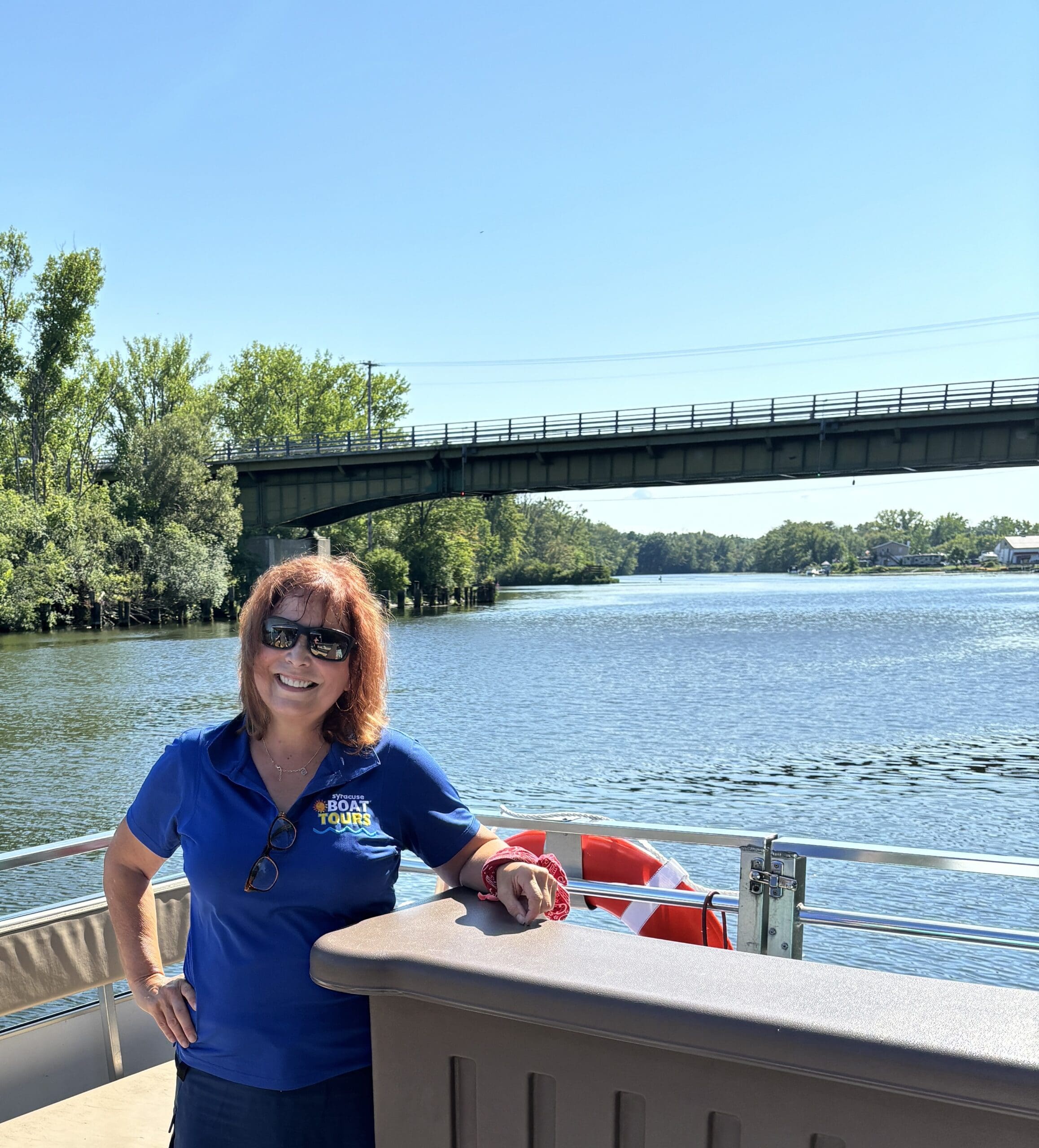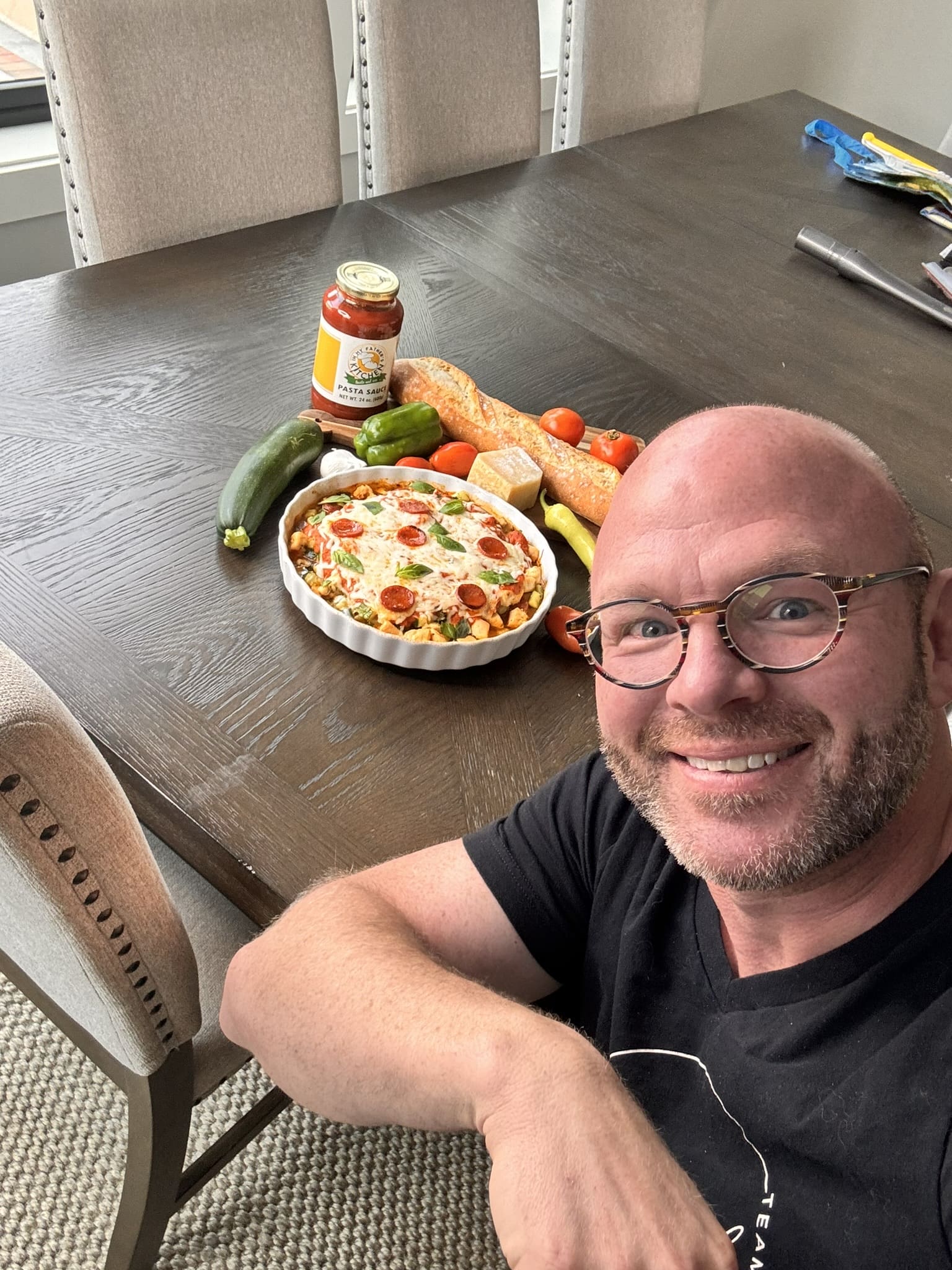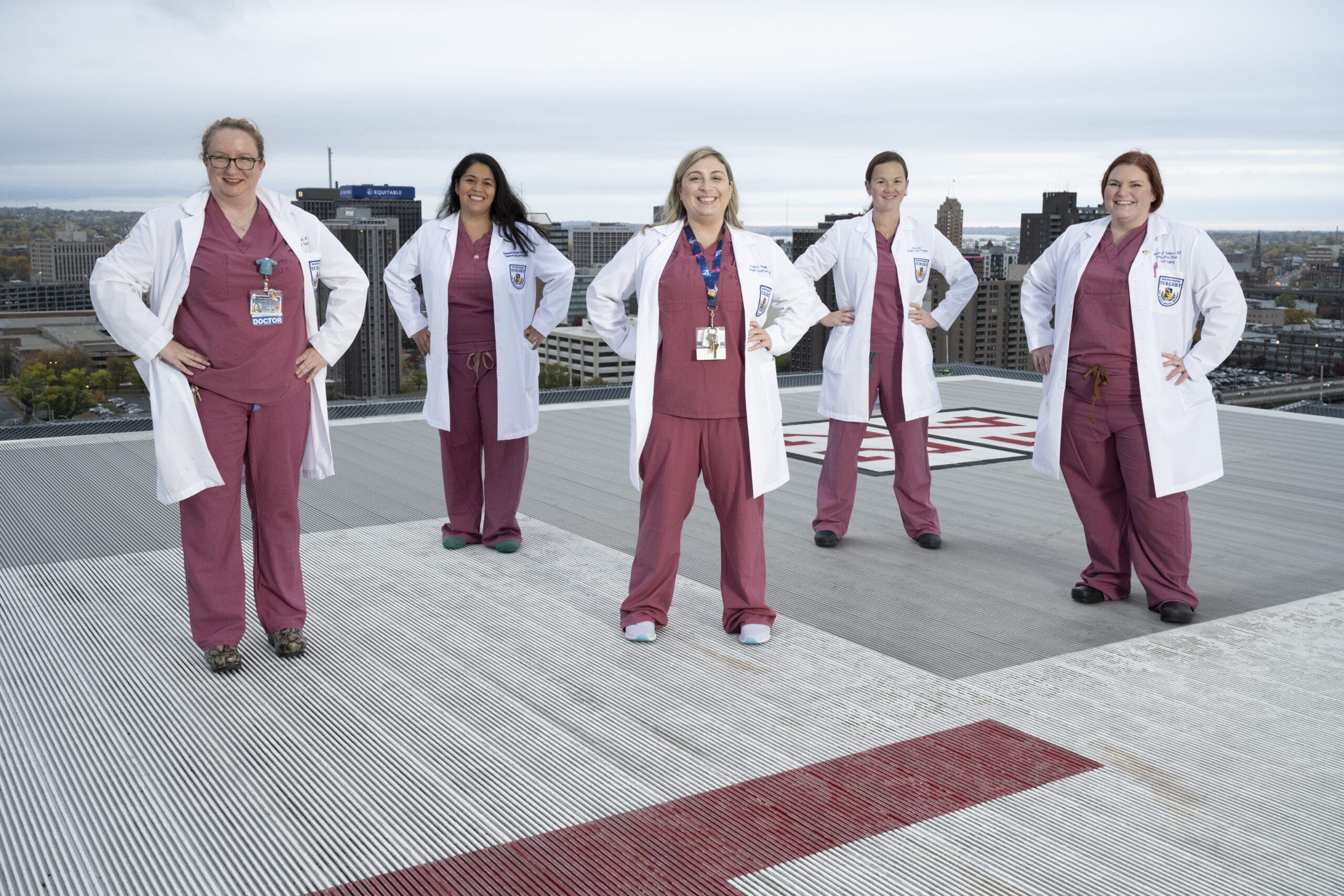The Story of 16 Balloons
By Lorna Oppedisano | Photography by Alice G. Patterson
“Life was normal.”
This is how Tracey Burkey, two-year breast cancer survivor and 30-year Visit Syracuse staff member, begins the story of her fight with breast cancer.
Tracey had no family history of breast cancer. She dutifully had a mammogram done each year. It was just one of those things the doctor tells you to do, so you do it, she said. You put it on your list, do it, check it off and move on with your life.
In March 2015, Tracey almost left that box unchecked, ready to put it off for another day. It was a busy week at work. The NCAA Championship was coming to town the following week, which meant she had teams to welcome, TV interviews to do and volunteers to train, among other tasks to complete.
But the appointment was already slated for 8 a.m., and on the way to work. So, she went. And it’s a good thing she did.
A few days later, she received a call that changed her life. She had breast cancer, the voice on the other end of the line told her.
“I felt like I had learned a valuable lesson,” Tracey said. “Even with no family history, you have to get your mammograms, because it happens — more than we know. And I’m a story of a survivor, because I had the mammogram.”
Defining normal
Born and raised in Canastota, Tracey studied at Niagara University, spent a bit of time as an exchange student in Japan and eventually began her career in New Jersey, where she worked as a travel agent. While she loved the system, she didn’t care for the job itself.
Before long, she returned to Central New York, and took a position in tourism sales at the Syracuse Convention & Visitors Bureau, now known as Visit Syracuse. She’s been with the group ever since.
“I’ve done some different roles through the years, but still absolutely love going to work every day,” Tracey said. “I’m very fortunate.”
After a recent reorganization at Visit Syracuse, Tracey took over as vice president of visitor and partner engagement.
No two days are the same, Tracey explained, but a main goal of her job is working with hospitality and community partners to help embrace visitors who come to Syracuse — to “roll out the red carpet,” she explained.
She also works to bring large-scale events and conventions to Syracuse, including the Syracuse Nationals, NCAA Championship and the American Quilter’s Society’s annual QuiltWeek, just to name a few.
In the last 30 years on the job, Tracey’s seen Syracuse grow and evolve, from the expansion of Carousel Center into Destiny USA to the revitalization of iconic older buildings downtown. Now, rather than simply anticipating what visitors to Syracuse may need, she helps envision their entire experience. Whether they’re here to visit family or for a convention, it’s that experience that counts, she said.
“It’s about the flavor of the area,” she explained. “So, how do we create that for them?”
The diagnosis
So, life was normal for Tracey, and that was just the way she liked it.
Then came the fateful morning of the nearly-rescheduled mammogram. With no history of breast cancer in her family, mammograms were always routine — until this one.
The radiologist saw a little spot, and suggested Tracey have a biopsy.
When she arrived at work, she found a message from her gynecologist, telling her she had an appointment for a biopsy at the end of the week, and an appointment with a surgeon. She remembers thinking it was a little extreme.
“So, I got a little nervous,” Tracey said, “but I was busy.”
There are bits of the story Tracey looks back on as blessings or angels, she explained. She came across the first on the day of her biopsy — a woman she had gone to high school with in Canastota. They chatted, and the familiarity put Tracey at ease.
The surgeon’s office promised to call Tracey the following Tuesday — two days before the NCAA teams were slated to come to town. Tracey and a friend went into the basement at work to take the call.
Then, the surgeon said eight words Tracey hadn’t been expecting to hear: “I’m sorry to say you have breast cancer.”
Tracey just glazed over. It was a good thing her friend was there to take notes, she remembered.
“It’s small,” they told her. “We’re looking at probably a lumpectomy and radiation.”
Her friend called Tracey’s husband, and he said he’d be right over.
“No,” Tracey told him, explaining she had a staff meeting and TV interviews, and then she’d be home. “I’ll be fine.”
So, she stuck with the plan and finished her day.
Tracey and her husband told their children, who assured her they wouldn’t worry if she didn’t. She also talked to her neighbor, who coincidentally had worked at Upstate for Tracey’s surgeon in breast care.
“She was truly a godsend to me because she talked me through things,” Tracey said. “Because it’s so overwhelming when you get this. I wasn’t very educated on it. What did I need to know? It was frightening.”
Going off-course
“I found that through this, I needed a plan, and as long as you gave me a plan of what to do, I was fine,” Tracey said.
She got through the NCAA tournament. She’d already scheduled a vacation afterwards, and took it. Then she went to St. Joseph’s Hospital Health Center for her lumpectomy. Everything was going according to plan.
But when she went to the surgeon for a follow-up, she was told the margins weren’t clear. She’d have to get a second lumpectomy.
OK, on to Plan B.
The second lumpectomy was scheduled, and happened to fall on Tracey’s son’s 16th birthday. She’d promised to take him to get his permit. Not wanting to break her word, she figured they’d go to the DMV at 9 a.m., giving her plenty of time to get to the surgeon’s for the 10:30 a.m. appointment.
“Yeah, well, we didn’t have the right paperwork,” Tracey said.
She ended up breaking down in the parking lot. It’s OK, her son told her. They would just go back after the surgery, he assured her.
“I felt horrible about that. Because in my mind, the more normal I could keep this, the better off I was,” she explained. “And that threw me.”
Tracey continued on with the day’s plan, and had the lumpectomy. She went to the office by herself, assuring her husband she’d be fine. But then the surgeon came to speak with Tracey, and said she might want her husband to come by.
Even with second lumpectomy, they couldn’t get it all, the surgeon explained. They’d need to do a mastectomy, Tracey was told.
Tracey was set up with a plastic surgeon. The night before her appointment — probably the worst night of the whole ordeal, she remembered — her oncologist called. He told her he’d looked at the tests, and she’d have to undergo chemo treatments.
Tracey’s oncologist also happened to have treated her father when he went through a 12-year battle with cancer. The chemo Tracey remembered from her father’s illness was filled with very intense, terrifying sessions. Her own treatments would not be the same, the oncologist assured her.
Originally, the plan was surgery first, and then chemo. But after her team talked, they agreed it would be best to do chemo first.
“So, I had given up even trying to update anybody by that point, because it was getting so frustrating,” Tracey said, “and I’m like, ‘Please just give me a plan and stick to it.’”
The chemo was set to begin in early June. Tracey went to pick out a wig beforehand at Profiles by Kristen — another angel she met along the way, Tracey said. Her chemo treatment was broken into 16 sessions, the first four happening every other week, and then increasing to once a week for the last 12.
“The first two days, I didn’t feel good,” she said. “But I got through it. And it was really not as bad as I thought. The nurses at [Hematology-Oncology Associates] are amazing.”
Paying it forward
Toward the end of the chemo treatment, Tracey saw a flyer in the chemo room for the American Cancer Society’s Making Strides Against Breast Cancer event. It was two weeks away. Tracey and her husband gathered together friends and family, and her team — Tracey’s Angels — had 22 people on it.
It’s through events like the Making Strides walk or her recent appointment to American Cancer Society’s board of directors that Tracey hopes to connect with and help others going through similar battles. When Tracey herself was starting chemo, a friend who’d gone through it helped her understand what she was about to face.
“What can I do to thank you?” she asked her friend.
“You can pay it forward,” her friend answered.
During her chemo treatment, three people Tracey knew were diagnosed. She’s up to eight people she checks in on now.
“It’s amazing how we all have connected and bonded together over something that you wish you didn’t have to,” Tracey said.
The new normal
Tracey’s last day of chemo was bittersweet. Her “new” routine — the weekly chemo, the normal doctors appointments — was coming to an end, and she really didn’t know how to feel.
After bidding farewell to the staff, Tracey and her husband walked out to her car, to find it filled with 16 pink balloons and 16 roses — symbolizing each chemo treatment.
Along with the roses and balloons, they’d left her a poem. It read, “Woohoo! You did it! Now take a few moments to reflect on what you’ve been through and how great you did. But then I want you to go home and let the balloons go. It’s time to put this part behind you and move forward.”
When she got home, Tracey and her husband reflected on the journey, and then let the balloons go.
“And I’ve done that for two other people since,” Tracey said. “It was such a way to put some closure to something.”
Once the chemo was done, Tracey had the mastectomy and reconstructive surgery. In the two years since, her hair has grown back a considerable amount. But things are far from “normal,” she mused.
“There’s not a normal anymore,” Tracey said. “It’s a new normal. You’re a whole different person than you ever were.”
She definitely appreciates every day, even the tough ones, Tracey said. She finds strength in the team that helped her through it all, the crew at the American Cancer Society and other people who have gone through similar struggles.
When she was going through her chemo, Tracey wasn’t eager to share her story. She didn’t want to be defined by breast cancer. But now, she does realize how important it is to talk about it.
If her story can affect one person’s life, Tracey said, it’s worth telling.
“I got dealt this card, and I got through it with help of so many people,” Tracey said. “You can get through it. Please go get your mammogram.” SWM
For more information on the American Cancer Society, visit cancer.org.
This year’s Making Strides Against Breast Cancer walk is slated for Sunday, Oct. 15, at the SRC Arena at Onondaga Community College. Check-in scheduled for 8:30 a.m.; opening ceremony, 9:30 a.m.; walk begins, 10 a.m. For more information, contact Rebecca Flint at SyracuseNYStrides@cancer.org or (315) 433-5635.





